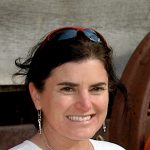IfSC and Dept. of Geography host Dr. Leila Harris
Date: 2/5/2018
Author: Garett Sansom, Associate Director
Dr. Leila Harris is an Associate Professor at IRES Institute on Resources Environment and Sustainability and in the Institute for Gender, Race, Sexuality and Social Justice at the University of British Columbia. She also serves as Co-Director for UBC’s Program on Water Governance, is a member of the EDGES research collaborative (Environment and Development: Gender, Equity, and Sustainability Perspectives), and is an Associate of the Department of Geography, and the Peter Wall Institute for Advanced Studies at UBC. She will be presenting on Monday 26 Feb, give a special research presentation co-sponsored by Geography and the Water Security Initiative of the Institute for Sustainable Communities. Please contact us if you are interested in attending.
The below outlines details of the talk:
Implementing, Narrating, and Resisting the Human Right to Water
The human right to water has been intensely debated in the last several decades, particularly since the formal adoption of the right by the UN General Assembly in 2010. Among other contours of the debate, some have highlighted the difficulties of implementation, while others have suggested that a rights framework is inappropriate for the many challenges regarding water access and quality for impoverished and marginalized populations. The approach taken for this talk is to investigate the human right to water, not as a legal principle, nor as a global policy regime, but rather as a daily lived reality for millions of people around the world. In particular, I focus on the context of underserved communities in Cape Town and Accra to ask: how do people in these sites narrate and express their experience of uneven and differentiated access to, and quality of water? To what degree does the human right to water and sanitation affect conditions and experiences in these locales, whether in terms of altering the material conditions of water, or in terms of ways that residents themselves express and negotiate these daily realities? My argument is that the human right to water and sanitation needs to be understood as much more than a question of basic access to water in terms of locations of standpipes, or minimal flows to meet daily bodily needs (e.g. 50 l per person/day). Instead, I am interested in exploring the HRW in terms of the meanings that people attach to the differentiated, unequal and uncertain geography of daily water access and quality. With this focus, I ask: How do people understand themselves, or their communities, in relation to their lived experience of uneven, uncertain, and unequal access, and how does this affect their sense of themselves (subjectivity), their senses of inclusion / exclusion as well as their relationship to key socio-political differences in their communities (articulations of socio-spatial difference), or shifting notions of state-society relations?
Date & Time: February 26th, 3:30-4:30
Location: Rudder Tower Room 404

Dr. Leila Harris